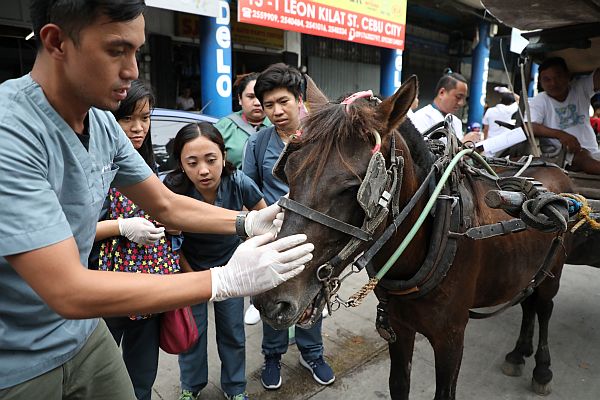
KABAYO CHECK UP DAY. Dr Wilfred John Salvador of Southwestern University College of Veterinary Medicine, checks one of the carriage horses for injuries during yesterday’s Kabayo Check Up Day which also included hoof cleaning, deworming and vitamin supplementation, among other services.
(CDN PHOTO/Tonee Despojo)
KABAYO CHECK UP DAY
Under the scorching heat of the sun or the tempestuous torrent of rain, or both on some occasions — carriage horses — for years, have provided important mode of transport for Cebu City residents.
And for years, they have been neglected.
While we give our pet dogs and cats proper care like specialized food, vitamins, vaccines, grooming and regular visits to the vet, our hard working carriage horses hardly had any of these.
That finally changed yesterday.
At least 30 carriage horses benefited from the free check up and health services initiated by the Cebu City Veterinary Office–Department of Veterinary Medicine and Fisheries dubbed “Kabayo Check Up Day.”
The activity, which was held in Leon Kilat Street where the carriage horses usually park and wait for passengers, consisted of carriage horse registration, general health check up, hoof cleaning, deworming and vitamin supplementation.
Today, the representatives from DVMF will be extracting blood from the horses to be submitted to the Department of Agriculture for examination to determine what diseases they are suffering from.
DVMF veterinarian Wilfred John Salvador said that the check up caravan aims to spread awareness among carriage drivers and horse owners on how to properly take care of the horses to optimize their working abilities.
“One goal of this activity is to spread information on how to better take care of the horses for them to live longer and healthier,” said Salvador.
Salvador explained that with the amount of labor that the horses do, the food that should be given to them should compensate to the prescribed needs of the horses.
“The amount of hay that should be given to them is around 1.5 percent of their total body mass, and there should be supplemental feeds for the horses. However, that is not really being followed well,” said Salvador.
Aside from malnutrition, Salvador said that some horses also had wounds and injuries on their hooves.
“All the problems that we saw so far were only minor like wounds. Thankfully, those were things that can still be easily addressed,” added Salvador.
According to Salvador, there are some carriage owners who declined to have their horses checked because of fear that their horses will become drowsy or weak and cannot work for the rest of the day.
“We tried to explain to them that it does not matter to the horses if they will undergo the check up. The horses can still go on with their jobs, but some still declined,” he said.
According to Salvador, horses as early as one year old can already be used for labor as long as their muscles are already developed.
“These horses had been used for the longest time, but now, we just want to find ways for them to be better and healthier.”